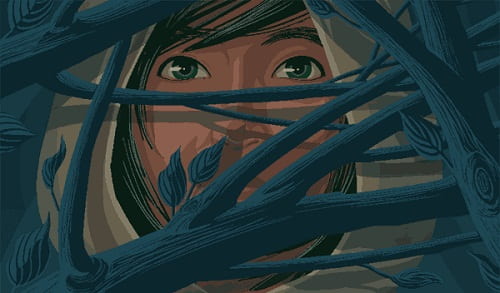A Closed World, a JRPG set in a fog-laden forest that is metaphorically the psyche of the queer protagonist. The game follows our protagonist as they battle their demons, in terms of unhealthy relationships and poor guidance through their queer youth.
The game environment is bleak, mystical, and shrouded just as a youth who may have faced prejudice their entire life may be. The ‘combat’ system, follows the protagonist fighting against demons representing past memories from their mother, brother, and father. Whilst most RPGs utilise an elemental triangle (fire beats water, water beats earth, earth beats fire, etc..) A Closed World utilises a Logic verse Ethics verse Passion paradigm.

The gameplay is quite simple, and whilst the storyline pulls us as the critical player into the world of our protagonist, the simplicity of the gameplay leaves me wanting more in terms of a challenge. Jane McGonigal in her book Reality Is Broken (2011, pp. 28-29) touches on how difficulty and engagement with gameplay can impact our true digestion of story and messaging. So whilst I personally have an interest in LGBTQI+ rights, and empathy to those who have faced prejudice, if I didn’t I might find it hard to find the curiosity to push through the simplistic gameplay.
A Closed World uses evocative storytelling to understand the protagonist’s plight and is effective in building a complex back story while the game itself is only around 20-minutes long. Yet, my criticism lies in the vagueness overall, the character is hooded and devoid of gender, not that gender is needed, in the specificity of telling the story of the LGBTQI+ community. But this was also echoed by the MIT Gambit team who developed the game, Todd Harper (2011) the leader of Gambit discussed their largest issue was trying to represent the community as a whole, whilst not being too vague to exclude a genuine emotional connection to the story and player.
In saying that, as a white straight male, I have the privilege of representation, so even the consideration of queer identity in-game (especially as a protagonist, and story arc) still has a powerful impact in terms of consideration and representation within the video game industry.

References
Harper, T 2011, ‘Knowing When to Compromise’, MIT Gambit, Blog Post, 8 July, viewed 7th April 2021, <http://gambit.mit.edu/updates/2011/07/knowing_when_to_compromise.php>
McGonigal, J 2011, ‘What Exactly is a Game?’, Reality Is Broken: Why Games Make Us Better and How They Can Change the World, Penguin Press, pp. 19-35.
